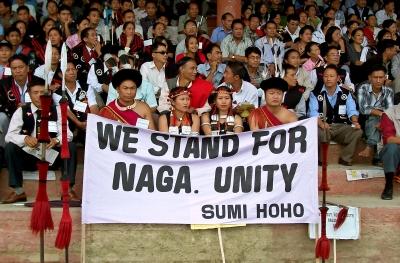'For years, a whispering campaign against the non-Nagas -- and occasional violence -- has dominated the local discourse, but Farid Khan's lynching was unprecedented in its ferocity,' says Nitin A Gokhale.
 On Thursday, March 5, even as television channels spent hours and hours of air time discussing whether or not the BBC documentary India's Daughter should be allowed to be broadcast, Dimapur, the commercial capital of Nagaland, erupted in unprecedented mob fury that ended in the brutal lynching of rape accused Syed Farid Khan.
On Thursday, March 5, even as television channels spent hours and hours of air time discussing whether or not the BBC documentary India's Daughter should be allowed to be broadcast, Dimapur, the commercial capital of Nagaland, erupted in unprecedented mob fury that ended in the brutal lynching of rape accused Syed Farid Khan.
Thousands of people marched into the lightly guarded central jail, pulled out Khan -- who was under judicial custody, accused of the rape of a local girl -- and dragged him naked for nearly seven kilometres even as he was beaten, stoned and abused all along the way.
According to local newspaper reports, by the time the accused was brought to the centrally located Clock Tower area of the town, Khan was dead.
The shocking incident of vigilante justice took place in the full glare of the state administration, police and even bystanders. Such was the mob's anger that none dared intervene, eyewitnesses I spoke to said.
Khan, a Bengali-speaking trader who divided his time between Assam and Nagaland, was arrested on February 24 after a complaint was lodged by a college girl against him.
Word quickly went around that Khan was an Illegal Bangladesh Immigrant, IBI, although he belonged to Karimganj in southern Assam and was an Indian citizen.
Clearly, inflamed passions overrode reasoning resulting in a 10,000-strong mob taking the law into its own hand and brutally kill Khan.
Several questions about the case remained unanswered. Some reports say the accused and the girl may have been in a relationship that went wrong. The Nagaland administration has now admitted that it failed to anticipate the anger simmering among the residents of Dimapur.
The district collector and the superintendent of police have been placed under suspension, because of the lapses that led to this totally unacceptable situation. Khan's gruesome killing must not go unpunished.
The state government will have to take a closer look at developments in Nagaland and especially Dimapur in recent months that point to the likelihood of rising tension in the near future on account of the growing anger against, what is now locally known in Nagaland, the 'IBI people.'
Nagaland, one of the three states in the region -- Mizoram and Arunachal Pradesh are the other two -- which follows the decades-old Inner Line Permit, ILP, system.
Under ILP rules, non-tribals from outside respective states cannot become permanent residents or even purchase land.
For at least a quarter century now, many non-Nagas -- mostly traders, businessmen and manual labourers -- have made a beeline to the state. Dimapur, the only big town in Nagaland to be exempt from ILP provisions, has therefore gradually become a melting pot of ethnicity.
The number of non-Nagas, among them Bengali-speaking Muslim migrants both Indians as well as 'illegal' Bangladeshis, has increased manifold in Dimapur and surrounding areas over the past couple of decades.
Many migrants have married Naga women and become land owners by proxy. For years, a whispering campaign against the non-Nagas -- and occasional violence -- has dominated the local discourse, but Farid Khan's lynching was unprecedented in its ferocity.
Although the Nagas continue to be the elite section of society, increasingly, the 'outsider' keeps the well-oiled subterranean economy working.
The Nagas, fearing marginalisation in their own state, have started agitating against the outsider, or more precisely the 'IBI', more openly than before.
As one of the state's numerous dailies, Eastern Mirror, noted in an editorial on Friday: 'Various intelligence agencies had already warned of serious consequences if immediate attention to the illegal immigrant issue in the state was not tackled. Similar violence may occur in many places in the state too because for quite some time, there have been charged campaigns against the IBIs in the state.'
'The seething anger is already there against the excesses committed by these IBIs. Any heinous crime such as rape would only give those who had vigorously campaigning to take on alleged IBIs hands down (sic),' the newspaper noted.
'The illegal Bangladeshi infiltration into the state has changed its demography and now it has become a serious threat to the future survival of the indigenous people and the internal security problem of the state as well.'
Neighbouring Assam had witnessed a six-year long agitation against illegal Bangladeshis in the 1980s, but now smaller states -- Meghalaya and Nagaland in particular -- are witnessing frequent instances of 'anti-outsider' protests erupting at the slightest provocation. The issue is complex and has no easy solutions.
State governments, political and social leaders as well as powerful student organisations, will have to sit down together and evolve a consensus in dealing with the problem.
Otherwise, parts of the North-East will continue to witness such horrific incidents in the near future too.
Nitin A Gokhale is one of the nation's best-known commentators on the North-East.










